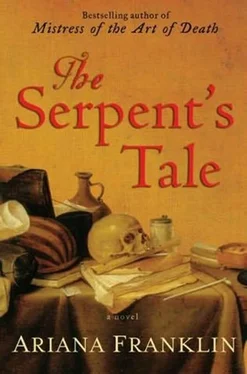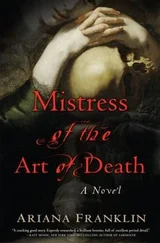But today, against all evidence, hope told Adelia that there was something beyond these shutters. At least there were steps leading to the river, and the river, however treacherous, led to the outside world. It was sunny, and there was an indefinable feeling in the air.
She’d been afraid too long, besieged too long, threatened too long, shut in dark rooms during daylight like a hostage-they all had.
Hearing talk and laughter, she gave the shutters a push that threw them back against the wall and leaned out again.
Farther along, the convent gates were opening and a crowd of chattering men and women were assembling outside them. In their center was a slim, elegant figure dressed in furs with a sheen that glowed in the sun.
“The queen’s going skating,” Adelia said. She turned round. “And so are we. All of us. Allie, too.”
Everybody did. It was, after all, Saint Stephen’s Day, which, by tradition, belonged to the servants, whom, since they could not go home to their villages, had to enjoy it in situ. Tonight it would be their privilege to have their own private feast on last night’s leftovers.
Almost every worker in the abbey tumbled out onto the ice, some without skates but all carrying the traditional clay box that they rattled invitingly under the noses of the guests.
Having made her contribution, Adelia turned to delighting her daughter by attaching her belt to the cradle and skimming the child in it over the ice as she skated. Others on skates similarly obliged those who had none, so that the wide sweep of the Thames became a whirl of sledges and trays, of puffed jokes and pink cheeks, through which a smiling queen sailed, swanlike, with her courtiers gaggling after her.
The nuns joined them after Lauds, the younger ones shrieking happily and vying with Sister Havis, who, while making it seem stately, outraced them all.
A brazier was placed on the ice near the bank and a chair carried to it so that Mother Edyve could sit by its warmth in company with the walking wounded that Sister Jennet had brought from the infirmary. Ward, whose attempts to scrabble along behind Adelia kept ending with his legs splaying into a quadrant, gave up the battle and settled down to sulk on the piece of carpet under the abbess’s chair.
Adelia saw her patient and skated over to him, dragging the cradle behind her. “Are you progressing well?”
Poyns’s young face was abeam. “Right nicely, mistress, I thank ee. And the abbess is giving me a job, assistant gatekeeper to Master Fitchet. Don’t need two arms in gatekeepin’.”
Adelia smiled back at him. What a nice abbey this was.
“And thank Master Man…Manum…thank the doctor for me; God and the saints bless him.”
“I will.”
Tables appeared bearing some remnants of the Christmas feast.
Sitting on somebody’s homemade sledge on the far bank where Ward joined them, Adelia and Gyltha masticated Allie’s dinner for her and ate their own, ignoring the child’s persistent “Bor, bor,” asking to be taken onto the ice again.
“She means ‘more,’” Adelia said proudly. “That’s her first word.”
“Them’s her first orders,” Gyltha said. “Who’s a little tyrant, then?” She abandoned her lamb chop to Ward, picked up the belt, and skated off with the cradle, throwing up a spray of ice behind her.
Adelia and her dog sat on. From here she had a panorama of the convent walls. There were now two of Wolvercote’s men patrolling, both of them keeping their eyes on the trees behind her. A figure stood at one of the windows in the men’s guesthouse-she thought it was Master Warin.
No sign of the abbot, thanks be to God; he’d become dreadful to her, as, with her rejection, she must have become dreadful to him-and would be punished for it.
The bridge had been closed; she could tell that because some Wolvercote villagers were crowding the far side of it, wistfully watching the merrymakers on ice. Others were digging their own path down to the river.
Behind her, in the forest that she’d hoped would be hiding Henry Plantagenet and his army, she could hear the shouts of the younger convent men as, careless of wolves, they scoured the undergrowth in the hunt for a wren, their noise indicating that they were not encountering anything larger.
She looked back to see their figures running through the trees, faces blackened with soot, as tradition demanded they should be. Why it was necessary to catch a wren at all on Saint Stephen’s Day she did not understand; she could never fathom English customs. Pagan, most of them.
She returned to watching the scene on the ice.
Wolvercote was talking to Eleanor at the food table. Where was Emma?
Adelia wondered what it was that had stirred the man into setting a watch now, when he had neglected any precaution for so long. Perhaps he’d sensed the same alertness in the air that so invigorated herself-or had just glimpsed another opportunity to assert his control. Either way, he was a fool as well as a brute; what point was there in guarding the abbey and, apparently, readying it in case of siege when nearly all its occupants were capering outside its walls, any one of whom could carry news of his presence in it to his enemy?
She was glad of it-the liberation. If it hadn’t meant leaving her nearest and dearest behind, she’d have been tempted to skate off and find Henry for herself.
But Schywz had just come out of the abbey gates and was viewing the indisciplined joyousness below him like a man who could organize things better. And, damn him, he was going to organize them better. Descending the steps, approaching Wolvercote, berating…
Within minutes he’d stationed his mercenaries at each end of the river’s bend. Nobody would get away now. He was actually scolding Eleanor, pointing her toward the convent gate… She was shaking her head, having too much fun, skating away from him.
They’d have to go in soon; the sun was getting low, withdrawing brightness and such warmth as it had bestowed. At last, Eleanor’s clear diction was heard thanking Mother Edyve for the entertainment. “So refreshing…” People were beginning to climb the steps of the track.
“Mistress,” said a crisp voice behind Adelia. It was Father Paton.
Rowley’s little secretary looked incongruous on skates, but he balanced on them neatly, his mittened, inky hands crossed on his chest as if protecting himself from the unworthy. “I have it,” he said.
She stared at him. “You… found it? I can’t believe…it was such a long shot.” She had to pull herself together. “And is it the same?”
“Yes,” he said, “I regret to say that the similarity with the one you gave me is undeniable.”
“It would stand up in a court of law?”
“Yes. There are peculiarities common to each that even the illiterate would recognize. I have it here, I have them both…” He began unbuckling the large scrip hanging from his belt.
Adelia stopped him. “No, no, I don’t want them. You keep them, and my affidavit. Keep them very safe until the time comes…and in the name of Jesus, tell nobody you have them.”
Father Paton pursed his lips. “I have written my own account of this affair, explaining to whomsoever it may concern that I have done what I have done because I believe it to be the will of my master, the late Bishop of Saint Albans…”
There was a swirl of ice as the bishop’s messenger encircled them and came to a sliding stop.
Jacques’s face was ruddy with exercise; he looked almost handsome, though his bishop would not have approved of the elaborate, hand-twirling, very Aquitanian bow he gave Adelia. “It’s done, mistress. With good fortune, they’re meeting in the church at Vespers. You and this gentleman should take your positions early.”
Читать дальше











